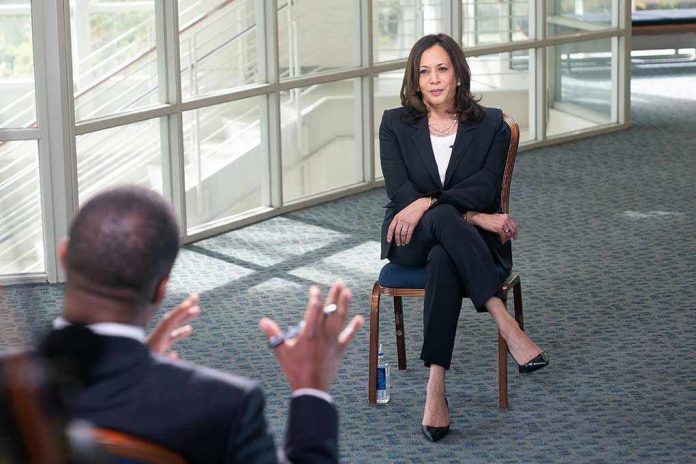
One year after Democrats’ stunning defeat, Jon Stewart’s relentless questioning of Kamala Harris left listeners wondering if political accountability in America is finally facing a reckoning.
Story Snapshot
- Jon Stewart publicly challenges Kamala Harris’s main excuse for the Democrats’ 2024 presidential loss.
- The interview exposes deep rifts in Democratic strategy and messaging, sparking a national debate.
- Stewart’s skepticism represents a broader demand for honest reflection and generational change.
- Harris’s answers foreshadow the Democratic Party’s internal struggle to redefine its future.
Stewart’s Blunt Approach Forces Democratic Self-Examination
Jon Stewart, long admired for his piercing political satire, confronted Kamala Harris on “The Weekly Show with Jon Stewart” in an interview that aired nearly a year after the 2024 election. Stewart rejected easy answers, pressing Harris on her core explanation for the Democratic defeat and demanding clarity on what, specifically, had gone wrong. The host’s refusal to accept party platitudes unsettled Harris and sent ripples through Democratic circles. Stewart’s reputation for exposing political spin made this exchange a cultural moment, urging America’s left to look beyond surface-level excuses and face uncomfortable truths about party failures.
Harris responded with calls to “deliver for people” and rebuild trust, but Stewart challenged whether such statements were more than empty rhetoric. The tension in the room was palpable as Stewart asked Harris to name concrete missteps. Was it the messaging, the policies, or a fundamental disconnect with voters? The questions mirrored frustrations felt by Democratic voters who had watched defeats mount and explanations multiply, yet saw little change in strategy. Harris’s willingness to engage in this public postmortem showed rare candor, but Stewart’s skepticism highlighted a broader demand for accountability and substantive analysis.
The Political Timeline: From Defeat to Reflection
Kamala Harris ascended as the Democratic nominee after Biden declined to run, inheriting a fractured party amid economic anxiety and residual polarization from the Trump years. The 2024 campaign exposed Democratic vulnerabilities, particularly in swing states where messaging failed to connect. Donald Trump capitalized on this discord, securing the electoral vote and returning Republicans to power. Harris, as outgoing Vice President, presided over the certification of her opponent’s victory in January 2025, a moment marked by both tradition and tension. The timing of Stewart’s interview—October 30, 2025—gave space for deeper analysis rather than immediate spin, setting the stage for a more honest reckoning.
The interview took place in a media landscape defined by generational shifts and consolidation, with independent voices like Stewart’s gaining influence. Previous Democratic defeats had often prompted shallow post-election analyses, but the Stewart-Harris exchange signaled a move toward substantive critique. Stewart’s history of holding politicians accountable, dating back to “The Daily Show,” added gravity to his demand for real answers, and Harris’s openness distinguished her from leaders who dodged scrutiny.
Implications for the Democratic Party and American Politics
The short-term impact of the interview was clear: Democratic leaders now face heightened pressure to provide substantive answers and reform strategies. Stewart’s critique resonated with voters weary of political spin and reinvigorated calls for transparency and authenticity. Longer-term, the exchange may catalyze shifts in party leadership, messaging, and outreach, as Democrats grapple with the question of how to win back trust and relevance. Stewart’s approach exemplifies the role of independent media in shaping political narratives, while Harris’s participation signals a willingness—however reluctant—to engage in public reflection.
The interview’s legacy may lie in its challenge to the status quo. As the Democratic Party debates its future, the demand for honest self-examination is likely to shape internal discussions and external messaging. The quality of political discourse, as influenced by voices like Stewart’s, will play a crucial role in determining whether American politics moves toward greater accountability or continues to rely on well-worn talking points. The electorate, meanwhile, remains hungry for leaders willing to confront uncomfortable realities and offer genuine solutions.
Expert Perspectives and the Road Ahead
Media analysts praise Stewart’s effectiveness in challenging political figures and fostering substantive debate, noting that such exchanges are vital for party renewal. Political strategists argue that Democratic messaging must evolve to address voter concerns directly, rather than relying on broad promises. Academic commentary points to the importance of post-election reflection in revitalizing party leadership and discourse, with some suggesting that generational shifts are overdue. Diverse viewpoints abound: some commend Harris for engaging publicly, while others find her explanations lacking. Stewart’s skepticism is widely seen as echoing public frustration with political spin, and the interview itself is cited as a turning point in ongoing debates about accountability and renewal.
The story is verified by multiple sources, including direct video evidence and mainstream news coverage. Stewart’s pointed questioning and Harris’s responses are documented across platforms, providing a comprehensive record of the exchange. While Harris insists Democratic policies were sound, critics and analysts point to deeper structural issues within the party, underscoring the complexity of the challenge ahead. The interview remains a vivid illustration of generational tension, media influence, and the urgent need for political renewal in America.
Sources:
Splinter – Maybe it’s time for Jon Stewart to step back



